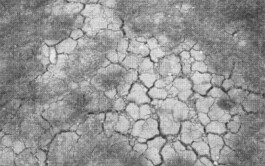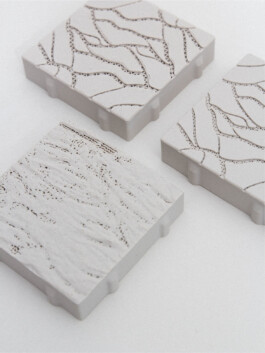
Permeable bike lanes for climate-resilient cities
Urban mobility is shifting from fossil-based, motorized transportation towards more sustainable ways to commute. Striving for a climate-resilient and safe city, mobility infrastructure transforms by decentering the car and redesigning cycle paths and cycle networks on a large scale.
At this moment in time, green mobility in particular needs to take on a planetary perspective and must avoid sealing even more surfaces.
Therefore the project „Perforating the City“ calls for a water-sensitive approach to urban bike lanes. Reacting to increasing weather extremes, the systematic approach aims to build mobility surfaces with permeable modules. By introducing decentralized rainwater management, the rain can percolate through the surface and be stored both in the ground and in the modules themselves, preventing flooding and contributing to groundwater. In times of heat and drought, solar radiation is reflected off the light-colored surface, stored water evaporates and supplies urban flora with cooling effects for the microclimate. The result is a mutual benefit from both the mobility and the planetary perspective that makes it especially valuable for cities to invest and combine funding.
The capitalogenic climate crisis increasingly triggers unprecedented climate changes, notably in urban areas, with a surge in extreme weather events – ranging from intense rainfall and floods to prolonged droughts and soaring temperatures. Faced with increasing urbanization and densification –two-thirds of the European population already live in conurbations– the element of water is of central importance in urban climate adaptation strategies. The way we deal with urban rainfall will determine whether we succeed in transforming particularly vulnerable areas into climate-resilient cities.



work in progress

Permeable bike lanes for climate-resilient cities
Urban mobility is shifting from fossil-based, motorized transportation towards more sustainable ways to commute. Striving for a climate-resilient and safe city, mobility infrastructure transforms by decentering the car and redesigning cycle paths and cycle networks on a large scale.
At this moment in time, green mobility in particular needs to take on a planetary perspective and must avoid sealing even more surfaces.
Therefore the project „Perforating the City“ calls for a water-sensitive approach to urban bike lanes. Reacting to increasing weather extremes, the systematic approach aims to build mobility surfaces with permeable modules. By introducing decentralized rainwater management, the rain can percolate through the surface and be stored both in the ground and in the modules themselves, preventing flooding and contributing to groundwater. In times of heat and drought, solar radiation is reflected off the light-colored surface, stored water evaporates and supplies urban flora with cooling effects for the microclimate. The result is a mutual benefit from both the mobility and the planetary perspective that makes it especially valuable for cities to invest and combine funding.
Tim Schuetze (he/him) is a Berlin-based industrial designer with a hands-on, material-driven approach. His work explores the intersection of cultural research, emerging technologies, and future materials, always grounded in a deep engagement with physical making. Experimentation, iteration, and learning from prototypes are essential to his process, shaping designs that balance function, innovation, and critical reflection.
His studio and workshop in Berlin-Schöneberg serve as both a research space and a production lab—where ideas are tested, refined, and brought to life through continuous making. Engaging with materiality, he investigates new fabrication methods and rethinks traditional production techniques to create meaningful and contextually aware design solutions.
He previously taught additive manufacturing at UdK Berlin, contributed to the height-adjustable Eiermann table with Richard Lampert, and is currently part of the design team at Konstantin Grcic Design GmbH.

Angaben gemäß § 5 TMG
Tim Schütze
Leuthener Straße 5
10829 Berlin
Vertreten durch: Tim Schütze
USt.IdNr. DE365217661
hello@timschuetze.com
Haftungsausschluss:
Haftung für Inhalte
Die Inhalte unserer Seiten wurden mit größter Sorgfalt erstellt. Für die Richtigkeit, Vollständigkeit und Aktualität der Inhalte können wir jedoch keine Gewähr übernehmen. Als Diensteanbieter sind wir gemäß § 7 Abs.1 TMG für eigene Inhalte auf diesen Seiten nach den allgemeinen Gesetzen verantwortlich. Nach §§ 8 bis 10 TMG sind wir als Diensteanbieter jedoch nicht verpflichtet, übermittelte oder gespeicherte fremde Informationen zu überwachen oder nach Umständen zu forschen, die auf eine rechtswidrige Tätigkeit hinweisen. Verpflichtungen zur Entfernung oder Sperrung der Nutzung von Informationen nach den allgemeinen Gesetzen bleiben hiervon unberührt. Eine diesbezügliche Haftung ist jedoch erst ab dem Zeitpunkt der Kenntnis einer konkreten Rechtsverletzung möglich. Bei Bekanntwerden von entsprechenden Rechtsverletzungen werden wir diese Inhalte umgehend entfernen.
Haftung für Links
Unser Angebot enthält Links zu externen Webseiten Dritter, auf deren Inhalte wir keinen Einfluss haben. Deshalb können wir für diese fremden Inhalte auch keine Gewähr übernehmen. Für die Inhalte der verlinkten Seiten ist stets der jeweilige Anbieter oder Betreiber der Seiten verantwortlich. Die verlinkten Seiten wurden zum Zeitpunkt der Verlinkung auf mögliche Rechtsverstöße überprüft. Rechtswidrige Inhalte waren zum Zeitpunkt der Verlinkung nicht erkennbar. Eine permanente inhaltliche Kontrolle der verlinkten Seiten ist jedoch ohne konkrete Anhaltspunkte einer Rechtsverletzung nicht zumutbar. Bei Bekanntwerden von Rechtsverletzungen werden wir derartige Links umgehend entfernen.
Urheberrecht
Die durch die Seitenbetreiber erstellten Inhalte und Werke auf diesen Seiten unterliegen dem deutschen Urheberrecht. Die Vervielfältigung, Bearbeitung, Verbreitung und jede Art der Verwertung außerhalb der Grenzen des Urheberrechtes bedürfen der schriftlichen Zustimmung des jeweiligen Autors bzw. Erstellers. Downloads und Kopien dieser Seite sind nur für den privaten, nicht kommerziellen Gebrauch gestattet. Soweit die Inhalte auf dieser Seite nicht vom Betreiber erstellt wurden, werden die Urheberrechte Dritter beachtet. Insbesondere werden Inhalte Dritter als solche gekennzeichnet. Sollten Sie trotzdem auf eine Urheberrechtsverletzung aufmerksam werden, bitten wir um einen entsprechenden Hinweis. Bei Bekanntwerden von Rechtsverletzungen werden wir derartige Inhalte umgehend entfernen.
Angaben gemäß § 5 TMG
Tim Schütze
Leuthener Straße 5
10829 Berlin
Vertreten durch: Tim Schütze
USt.IdNr. DE365217661
hello@timschuetze.com
Haftungsausschluss:
Haftung für Inhalte
Die Inhalte unserer Seiten wurden mit größter Sorgfalt erstellt. Für die Richtigkeit, Vollständigkeit und Aktualität der Inhalte können wir jedoch keine Gewähr übernehmen. Als Diensteanbieter sind wir gemäß § 7 Abs.1 TMG für eigene Inhalte auf diesen Seiten nach den allgemeinen Gesetzen verantwortlich. Nach §§ 8 bis 10 TMG sind wir als Diensteanbieter jedoch nicht verpflichtet, übermittelte oder gespeicherte fremde Informationen zu überwachen oder nach Umständen zu forschen, die auf eine rechtswidrige Tätigkeit hinweisen. Verpflichtungen zur Entfernung oder Sperrung der Nutzung von Informationen nach den allgemeinen Gesetzen bleiben hiervon unberührt. Eine diesbezügliche Haftung ist jedoch erst ab dem Zeitpunkt der Kenntnis einer konkreten Rechtsverletzung möglich. Bei Bekanntwerden von entsprechenden Rechtsverletzungen werden wir diese Inhalte umgehend entfernen.
Haftung für Links
Unser Angebot enthält Links zu externen Webseiten Dritter, auf deren Inhalte wir keinen Einfluss haben. Deshalb können wir für diese fremden Inhalte auch keine Gewähr übernehmen. Für die Inhalte der verlinkten Seiten ist stets der jeweilige Anbieter oder Betreiber der Seiten verantwortlich. Die verlinkten Seiten wurden zum Zeitpunkt der Verlinkung auf mögliche Rechtsverstöße überprüft. Rechtswidrige Inhalte waren zum Zeitpunkt der Verlinkung nicht erkennbar. Eine permanente inhaltliche Kontrolle der verlinkten Seiten ist jedoch ohne konkrete Anhaltspunkte einer Rechtsverletzung nicht zumutbar. Bei Bekanntwerden von Rechtsverletzungen werden wir derartige Links umgehend entfernen.
Urheberrecht
Die durch die Seitenbetreiber erstellten Inhalte und Werke auf diesen Seiten unterliegen dem deutschen Urheberrecht. Die Vervielfältigung, Bearbeitung, Verbreitung und jede Art der Verwertung außerhalb der Grenzen des Urheberrechtes bedürfen der schriftlichen Zustimmung des jeweiligen Autors bzw. Erstellers. Downloads und Kopien dieser Seite sind nur für den privaten, nicht kommerziellen Gebrauch gestattet. Soweit die Inhalte auf dieser Seite nicht vom Betreiber erstellt wurden, werden die Urheberrechte Dritter beachtet. Insbesondere werden Inhalte Dritter als solche gekennzeichnet. Sollten Sie trotzdem auf eine Urheberrechtsverletzung aufmerksam werden, bitten wir um einen entsprechenden Hinweis. Bei Bekanntwerden von Rechtsverletzungen werden wir derartige Inhalte umgehend entfernen.